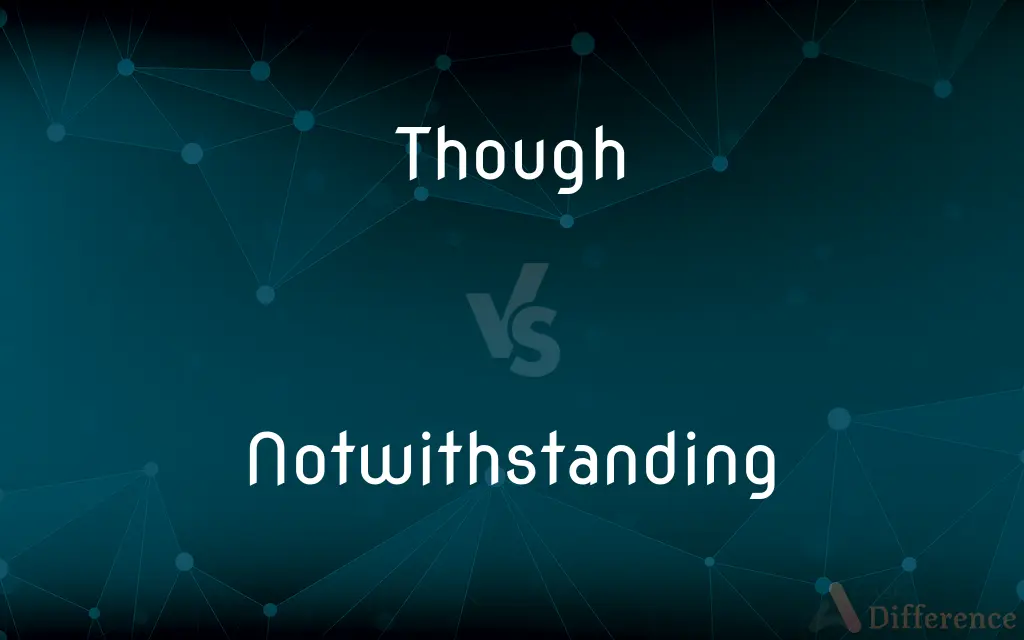Though vs. Notwithstanding — What's the Difference?
Edited by Tayyaba Rehman — By Fiza Rafique — Updated on April 29, 2024
"Though" implies a contrast or concession within a statement, whereas "notwithstanding" indicates that a fact does not prevent or interfere with another.

Difference Between Though and Notwithstanding
Table of Contents
ADVERTISEMENT
Key Differences
"Though" is often used to introduce a subordinate clause expressing a contradiction or concession to the main clause, while "notwithstanding" can be used as a preposition, adverb, or conjunction to signify that something occurs in spite of another fact.
"Though" typically softens or qualifies a statement, suggesting a surprising or unexpected contrast, whereas "notwithstanding" is used to emphasize the resilience or persistence of a fact despite obstacles or contradictions.
The placement of "though" is more flexible, often appearing at the beginning, middle, or end of a sentence; on the other hand, "notwithstanding" can directly precede a noun or at the start or end of a clause.
Using "though" tends to make language more conversational and informal, highlighting mild contrasts; conversely, "notwithstanding" carries a more formal tone, often used in legal or highly structured contexts.
The tone conveyed by "though" is generally lighter and less forceful compared to "notwithstanding," which provides a stronger assertion of exception or contradiction.
ADVERTISEMENT
Comparison Chart
Part of Speech
Conjunction, adverb
Preposition, adverb, conjunction
Usage Context
General, conversational
Formal, especially legal and academic
Function
Introduces a concessive clause
Indicates exception or contradiction
Tone
Mild, informal
Strong, formal
Sentence Placement
Flexible, can be used variously within a sentence
More rigid, often at the beginning or end of a clause
Compare with Definitions
Though
Can be used interchangeably with "although".
Though he tried hard, he didn’t win.
Notwithstanding
Emphasizes persistence or resilience.
Notwithstanding numerous setbacks, the team continued their work.
Though
Often placed at the end of a sentence for emphasis.
It was a hard job, though.
Notwithstanding
Maintains a formal tone in statements.
The rule is strict; notwithstanding, exceptions can be made.
Though
Softens assertions or conclusions.
He is quite friendly, though a bit shy at times.
Notwithstanding
Used to indicate something happens despite other factors.
Notwithstanding the bad weather, the event was successful.
Though
Indicates a mild concession.
Though not perfect, the plan was effective.
Notwithstanding
Often used in legal and academic contexts.
Notwithstanding the arguments presented, the court ruled in favor of the defendant.
Though
Used to introduce a contrasting element in a statement.
She decided to go, though she knew it might rain.
Notwithstanding
Can function as a synonym for "despite" or "in spite of".
Notwithstanding his lack of experience, he did a fantastic job.
Though
Despite the fact that; although
He still argues, though he knows he's wrong. Even though it was raining, she walked to work.
Notwithstanding
In spite of
This small contretemps notwithstanding, they both had a good time
Notwithstanding the evidence, the consensus is that the jury will not reach a verdict
Though
Conceding or supposing that; even if
Though they may not succeed, they will still try. See Usage Note at although.
Notwithstanding
Nevertheless; in spite of this
I didn't like it. Notwithstanding, I remained calm
Though
However; nevertheless
Snow is not predicted.
We can expect some rain, though.
Notwithstanding
Although; in spite of the fact that
Notwithstanding that the hall was packed with bullies, our champion played on steadily and patiently
Though
(Informal) Used as an intensive
Wouldn't that beat all, though?.
Notwithstanding
In spite of
The teams played on, notwithstanding the rain.
Though
(conjunctive) Despite that; however.
I'm not paid to do all this paperwork for you. I will do it this once, though.
Notwithstanding
All the same; nevertheless
We proceeded, notwithstanding.
Though
(degree) Used to intensify statements or questions; indeed.
"Man, it's hot in here." — "Isn't it, though?"
Notwithstanding
In spite of the fact that; although.
Though
Despite the fact that; although.
Though it is risky, it is worth taking the chance.
Notwithstanding
Nevertheless, all the same.
He, notwithstanding, persisted in his inquiries.
Though
(archaic) If, that, even if.
We shall be not sorry though the man die tonight.
Notwithstanding
Although; despite; even though.
Though
Granting, admitting, or supposing that; notwithstanding that; if.
Though he slay me, yet will I trust in him.
Not that I so affirm, though so it seem.
In the vine were three branches; and it was as though it budded.
Notwithstanding
In spite of, despite.
Notwithstanding personal preferences, the school district's rules on the topic govern our decision
Though
However; nevertheless; notwithstanding; - used in familiar language, and in the middle or at the end of a sentence.
I would not be as sick though for his place.
A good cause would do well, though.
Notwithstanding
Without prevention, or obstruction from or by; in spite of.
We gentil women beeLoth to displease any wight,Notwithstanding our great right.
Those on whom Christ bestowed miraculous cures were so transported that their gratitude made them, notwithstanding his prohibition, proclaim the wonders he had done.
Though
Despite the fact that;
Even though she knew the answer, she did not respond
Notwithstanding
Nevertheless; however; although; as, I shall go, notwithstanding it rains.
I will surely rend the kingdom from thee, and will give it to thy servant. Notwithstanding, in thy days I will not do it.
They which honor the law as an image of the wisdom of God himself, are, notwithstanding, to know that the same had an end in Christ.
You did wisely and honestly too, notwithstandingShe is the greatest beauty in the parish.
These days were ages to him, notwithstanding that he was basking in the smiles of the pretty Mary.
Though
(postpositive) however;
It might be unpleasant, though
Notwithstanding
Despite anything to the contrary (usually following a concession);
Although I'm a little afraid, however I'd like to try it
While we disliked each other, nevertheless we agreed
He was a stern yet fair master
Granted that it is dangerous, all the same I still want to go
Common Curiosities
What part of speech is "though"?
It functions as a conjunction and sometimes as an adverb.
Is there a difference in complexity between "though" and "notwithstanding"?
"Notwithstanding" is generally considered more complex and formal.
Where is "notwithstanding" commonly found?
It is commonly used in legal documents and formal writings.
How does "though" differ from "notwithstanding"?
"Though" introduces a concession more informally, while "notwithstanding" highlights an exception in a formal context.
Can "though" and "notwithstanding" be used interchangeably?
They are not usually interchangeable due to differences in tone and formality.
Is "though" appropriate for formal writing?
It can be used in formal writing, but it is less formal than "notwithstanding".
What does "notwithstanding" mean in legal contexts?
It is used to indicate that a statement holds true despite other clauses or stipulations that might suggest otherwise.
Can "though" start a sentence?
Yes, it can start a sentence when introducing a contrasting clause.
How does "notwithstanding" emphasize resilience?
It underscores that certain conditions or facts persist despite challenges or contradictions.
Which is more versatile, "though" or "notwithstanding"?
"Though" is more versatile and commonly used in both casual and formal contexts.
Share Your Discovery

Previous Comparison
Witty vs. Repartee
Next Comparison
Jaguarundi vs. JaguarAuthor Spotlight
Written by
Fiza RafiqueFiza Rafique is a skilled content writer at AskDifference.com, where she meticulously refines and enhances written pieces. Drawing from her vast editorial expertise, Fiza ensures clarity, accuracy, and precision in every article. Passionate about language, she continually seeks to elevate the quality of content for readers worldwide.
Edited by
Tayyaba RehmanTayyaba Rehman is a distinguished writer, currently serving as a primary contributor to askdifference.com. As a researcher in semantics and etymology, Tayyaba's passion for the complexity of languages and their distinctions has found a perfect home on the platform. Tayyaba delves into the intricacies of language, distinguishing between commonly confused words and phrases, thereby providing clarity for readers worldwide.
















































